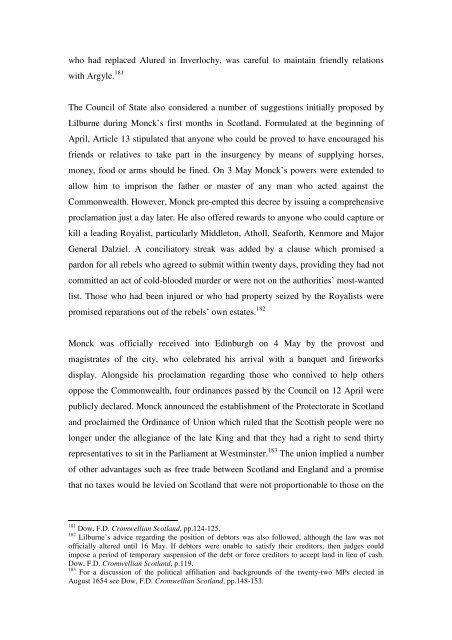The Glencairn Uprising, 1653-54 Helen Baker Department of ...
The Glencairn Uprising, 1653-54 Helen Baker Department of ...
The Glencairn Uprising, 1653-54 Helen Baker Department of ...
You also want an ePaper? Increase the reach of your titles
YUMPU automatically turns print PDFs into web optimized ePapers that Google loves.
who had replaced Alured in Inverlochy, was careful to maintain friendly relations<br />
with Argyle. 181<br />
<strong>The</strong> Council <strong>of</strong> State also considered a number <strong>of</strong> suggestions initially proposed by<br />
Lilburne during Monck’s first months in Scotland. Formulated at the beginning <strong>of</strong><br />
April, Article 13 stipulated that anyone who could be proved to have encouraged his<br />
friends or relatives to take part in the insurgency by means <strong>of</strong> supplying horses,<br />
money, food or arms should be fined. On 3 May Monck’s powers were extended to<br />
allow him to imprison the father or master <strong>of</strong> any man who acted against the<br />
Commonwealth. However, Monck pre-empted this decree by issuing a comprehensive<br />
proclamation just a day later. He also <strong>of</strong>fered rewards to anyone who could capture or<br />
kill a leading Royalist, particularly Middleton, Atholl, Seaforth, Kenmore and Major<br />
General Dalziel. A conciliatory streak was added by a clause which promised a<br />
pardon for all rebels who agreed to submit within twenty days, providing they had not<br />
committed an act <strong>of</strong> cold-blooded murder or were not on the authorities’ most-wanted<br />
list. Those who had been injured or who had property seized by the Royalists were<br />
promised reparations out <strong>of</strong> the rebels’ own estates. 182<br />
Monck was <strong>of</strong>ficially received into Edinburgh on 4 May by the provost and<br />
magistrates <strong>of</strong> the city, who celebrated his arrival with a banquet and fireworks<br />
display. Alongside his proclamation regarding those who connived to help others<br />
oppose the Commonwealth, four ordinances passed by the Council on 12 April were<br />
publicly declared. Monck announced the establishment <strong>of</strong> the Protectorate in Scotland<br />
and proclaimed the Ordinance <strong>of</strong> Union which ruled that the Scottish people were no<br />
longer under the allegiance <strong>of</strong> the late King and that they had a right to send thirty<br />
representatives to sit in the Parliament at Westminster. 183 <strong>The</strong> union implied a number<br />
<strong>of</strong> other advantages such as free trade between Scotland and England and a promise<br />
that no taxes would be levied on Scotland that were not proportionable to those on the<br />
181 Dow, F.D. Cromwellian Scotland, pp.124-125.<br />
182 Lilburne’s advice regarding the position <strong>of</strong> debtors was also followed, although the law was not<br />
<strong>of</strong>ficially altered until 16 May. If debtors were unable to satisfy their creditors, then judges could<br />
impose a period <strong>of</strong> temporary suspension <strong>of</strong> the debt or force creditors to accept land in lieu <strong>of</strong> cash.<br />
Dow, F.D. Cromwellian Scotland, p.119.<br />
183 For a discussion <strong>of</strong> the political affiliation and backgrounds <strong>of</strong> the twenty-two MPs elected in<br />
August 16<strong>54</strong> see Dow, F.D. Cromwellian Scotland, pp.148-153.
















